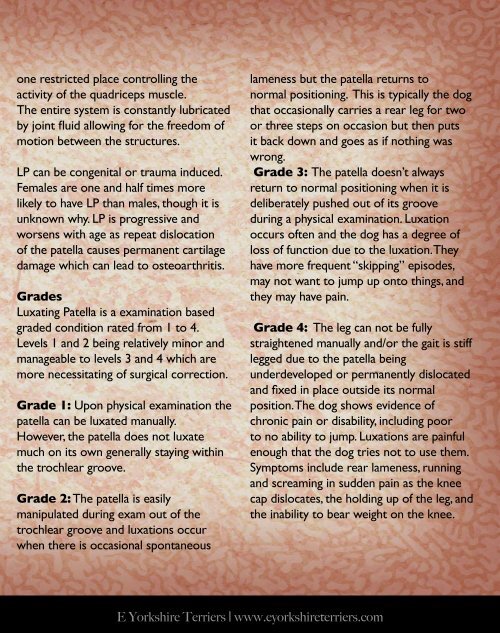Download Complete Oct/ Nov Edition in PDF Format - E Yorkshire ...
Download Complete Oct/ Nov Edition in PDF Format - E Yorkshire ...
Download Complete Oct/ Nov Edition in PDF Format - E Yorkshire ...
You also want an ePaper? Increase the reach of your titles
YUMPU automatically turns print PDFs into web optimized ePapers that Google loves.
one restricted place controll<strong>in</strong>g the<br />
activity of the quadriceps muscle.<br />
The entire system is constantly lubricated<br />
by jo<strong>in</strong>t fluid allow<strong>in</strong>g for the freedom of<br />
motion between the structures.<br />
LP can be congenital or trauma <strong>in</strong>duced.<br />
Females are one and half times more<br />
likely to have LP than males, though it is<br />
unknown why. LP is progressive and<br />
worsens with age as repeat dislocation<br />
of the patella causes permanent cartilage<br />
damage which can lead to osteoarthritis.<br />
Grades<br />
Luxat<strong>in</strong>g Patella is a exam<strong>in</strong>ation based<br />
graded condition rated from 1 to 4.<br />
Levels 1 and 2 be<strong>in</strong>g relatively m<strong>in</strong>or and<br />
manageable to levels 3 and 4 which are<br />
more necessitat<strong>in</strong>g of surgical correction.<br />
Grade 1: Upon physical exam<strong>in</strong>ation the<br />
patella can be luxated manually.<br />
However, the patella does not luxate<br />
much on its own generally stay<strong>in</strong>g with<strong>in</strong><br />
the trochlear groove.<br />
Grade 2: The patella is easily<br />
manipulated dur<strong>in</strong>g exam out of the<br />
trochlear groove and luxations occur<br />
when there is occasional spontaneous<br />
lameness but the patella returns to<br />
normal position<strong>in</strong>g. This is typically the dog<br />
that occasionally carries a rear leg for two<br />
or three steps on occasion but then puts<br />
it back down and goes as if noth<strong>in</strong>g was<br />
wrong.<br />
Grade 3: The patella doesn’t always<br />
return to normal position<strong>in</strong>g when it is<br />
deliberately pushed out of its groove<br />
dur<strong>in</strong>g a physical exam<strong>in</strong>ation. Luxation<br />
occurs often and the dog has a degree of<br />
loss of function due to the luxation. They<br />
have more frequent “skipp<strong>in</strong>g” episodes,<br />
may not want to jump up onto th<strong>in</strong>gs, and<br />
they may have pa<strong>in</strong>.<br />
Grade 4: The leg can not be fully<br />
straightened manually and/or the gait is stiff<br />
legged due to the patella be<strong>in</strong>g<br />
underdeveloped or permanently dislocated<br />
and fixed <strong>in</strong> place outside its normal<br />
position. The dog shows evidence of<br />
chronic pa<strong>in</strong> or disability, <strong>in</strong>clud<strong>in</strong>g poor<br />
to no ability to jump. Luxations are pa<strong>in</strong>ful<br />
enough that the dog tries not to use them.<br />
Symptoms <strong>in</strong>clude rear lameness, runn<strong>in</strong>g<br />
and scream<strong>in</strong>g <strong>in</strong> sudden pa<strong>in</strong> as the knee<br />
cap dislocates, the hold<strong>in</strong>g up of the leg, and<br />
the <strong>in</strong>ability to bear weight on the knee.<br />
E <strong>Yorkshire</strong> Terriers | www.eyorkshireterriers.com









